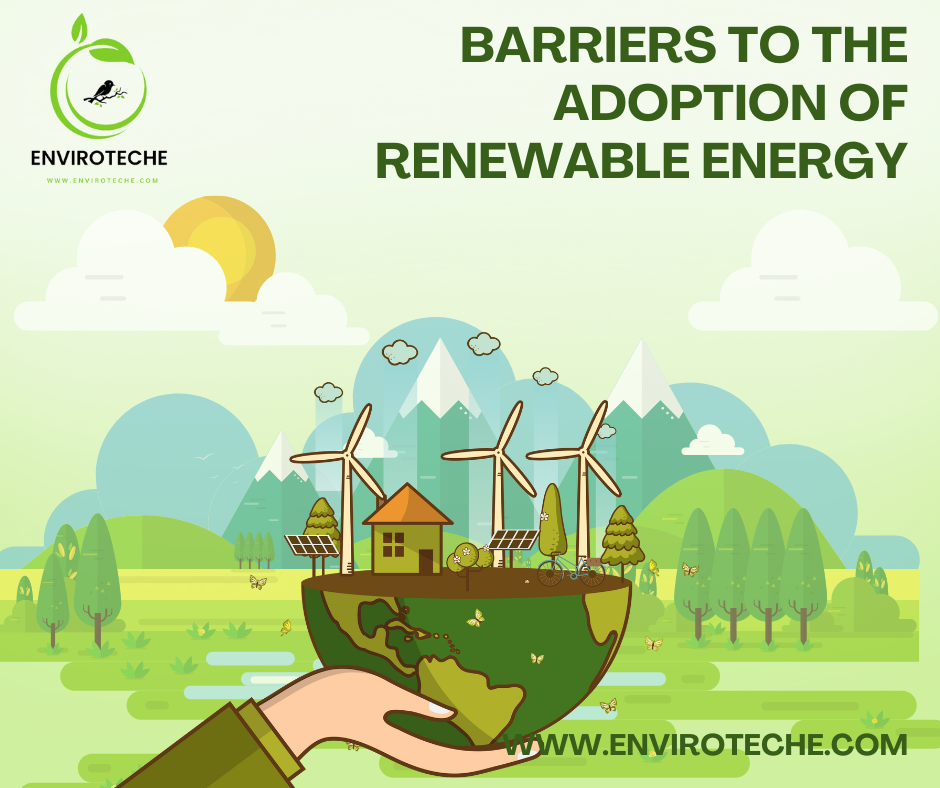
Barriers to the adoption of renewable energy
Irfan Haidri1, Fatima Batool1
1Department of Environmental Sciences, Government College University Faisalabad
Alternative to the environmental problems caused by conventional energy sources. However, a number of obstacles prevent the widespread use of renewable energy technologies. Technical, economic, and social factors make up these obstacles. By highlighting the advantages of renewable energy and addressing any potential concerns, public awareness campaigns and community involvement can help overcome social resistance.
Research and technological development should concentrate on raising the effectiveness and accessibility of renewable energy systems. By removing these obstacles, society can hasten the shift to a future with cleaner and more sustainable energy sources.
In this blog, we discussed the adoption of renewable energy is hindered by a combination of technical, economic, and social factors, and their viable solutions for widespread implementation.
Introduction to Barriers to the adoption of renewable energy
The use of renewable energy has drawn a lot of attention lately as a potential remedy for the environmental problems caused by conventional energy sources. However, a number of obstacles prevent the widespread use of renewable energy technologies. Technical, economic, and social factors make up these obstacles.
The integration of renewable energy into current energy systems is hampered by technical issues (Antonesi et al., 2023). The intermittent nature of renewable energy sources like solar and wind, which can result in inconsistent power generation, is one of the main challenges. To solve this problem, it is essential to create effective energy storage systems and smart grid technologies. The adoption of renewable energy is significantly influenced by economic factors.
Solar panels and wind turbines, for example, can have expensive initial installation costs. Although these technologies have lower long-term operating costs, the initial investment may prevent some people and companies from implementing them (Kar et al., 2023). The accessibility and availability of financing options for renewable energy projects can also affect how widely they are used.
The challenges that renewable energy faces are also influenced by social factors. The acceptance of renewable energy technologies by the general public can vary. Local residents may object due to worries about noise, visual effects, and landscape changes. Additionally, resistance to change may result from outdated infrastructure and vested interests in traditional energy sources (Kyriakopoulos et al., 2023).
Technical Barriers
There are a number of technical obstacles to the widespread adoption of renewable energy. The intermittent nature of renewable energy sources like solar and wind presents a significant challenge. In contrast to conventional energy sources, the production of renewable energy is influenced by the environment.
Keeping a consistent and reliable power supply is difficult because of this intermittency, especially when there is little or no generating activity (Richard et al., 2023). To meet this challenge, it is essential to create effective energy storage systems that can store surplus energy during periods of high generation for use later. The incorporation of renewable energy into the current energy infrastructure presents another technical challenge.
For centralized, fossil fuel-based power generation, many conventional power grids are built. Modernizing the grid infrastructure and creating smart grid technologies are necessary for integrating distributed and decentralized renewable energy sources (Abualigah et al., 2023). This guarantees effective management, transmission, and distribution of renewable energy sources. Another technical difficulty is the scalability of renewable energy technologies.
While installing small-scale renewable energy systems, like rooftop solar panels, can be fairly simple, doing so for larger projects can be challenging and require extensive planning and infrastructure development. There are often logistical difficulties associated with the development and installation of wind farms or solar power plants, such as issues with land accessibility, grid connectivity, and environmental concerns (Barteit, 2023).
Economic Obstacles
Significant obstacles to the widespread adoption of renewable energy are posed by economic constraints. The high initial installation costs of renewable energy technologies, such as solar panels or wind turbines, are a significant barrier. Although these technologies have lower long-term operating costs, the initial investment may prevent some people and companies from adopting them. The accessibility and availability of financing options for renewable energy projects are also very important (Kentikelenis & Stubbs, 2023).
The adoption of renewable energy may be hampered by limited access to affordable loans and a lack of supportive financial mechanisms. The creation of novel financing mechanisms, like feed-in tariffs or green bonds, as well as government incentives and policies that promote investment in renewable energy infrastructure are necessary for overcoming economic barriers. We can improve the environment for the transition to a sustainable and clean energy future by addressing these economic challenges (Hof, 2023).
Social Obstacles
The advantages and viability of renewable energy are still not widely known. Accurate information dissemination and public awareness campaigns can help dispel myths and improve public comprehension of renewable energy technologies. A common social barrier is resistance to change, particularly when switching from traditional energy sources to renewable ones. Due to worries about job losses or disruptions to their business models, current stakeholders in the fossil fuel industry may resist the change. In order to facilitate a just transition and overcome this resistance, effective policy frameworks and initiatives are required (McKie, 2023).
Solutions
Improved renewable energy technologies depend on ongoing research and development. The stability and dependability of renewable energy systems can be increased by making investments in cutting-edge storage technologies, grid infrastructure, and novel strategies like smart grids. By enacting beneficial policies, governments play a crucial role in promoting the use of renewable energy (Kar et al., 2023).
These can include goals for renewable energy production, feed-in tariffs, tax breaks, and regulatory frameworks that lower entry barriers and encourage the development of renewable energy. To promote investment in renewable energy projects, governments and financial institutions should offer accessible financing options, grants, and subsidies. This would assist in overcoming the financial obstacles brought on by high upfront costs and restricted access to capital.
Social barriers can be addressed with the aid of public awareness campaigns, educational initiatives, and community engagement programs (Dixit, n.d.). It is possible to encourage acceptance and support for renewable energy projects by accurately communicating the advantages of renewable energy, highlighting success stories, and involving communities in the decision-making process. A comprehensive strategy is needed to overcome these obstacles. To encourage the use of renewable energy, governments and policymakers should offer incentives like subsidies, tax credits, and benevolent regulations. Research and technological development should concentrate on raising the effectiveness and accessibility of renewable energy systems (Qadeer et al., 2023).
Advantages:
Adopting renewable energy has several benefits, one of which is providing our world with a cleaner and more sustainable energy source. However, a number of obstacles frequently prevent its widespread application. We can fully realise the promise of renewable energy and take use of all of its advantages by addressing and removing these barriers.
Conclusion
For the purpose of reducing climate change and ensuring a sustainable future, renewable energy must be adopted. However, a number of obstacles prevent its widespread application. Increasing the adoption of renewable energy can be facilitated by addressing the technical, economic, and social issues covered in this blog. Changes must be brought about through cooperation between governmental entities, businesses, researchers, and communities. High installation costs and a lack of available financing options are economic barriers that discourage both individuals and businesses. Social factors include disparate public perceptions, opposition from neighborhood groups brought on by visual effects and landscape changes, and vested interests in conventional energy sources.
Reference
Abualigah, L., Falcone, D., & Forestiero, A. (2023). Swarm Intelligence to Face IoT Challenges. Computational Intelligence and Neuroscience, 2023.
Antonesi, G., Cioara, T., Toderean, L., Anghel, I., & De Mulder, C. (2023). A Machine Learning Pipeline to Forecast the Electricity and Heat Consumption in a City District. Buildings, 13(6), 1407.
Barteit, S. (2023). Sandra Barteit*, Ali Sié 2, Pascal Zabré 2, I Traoré 2, Windpanga Aristide Ouédraogo 2, Valentin Boudo 2, Stephen Munga 3, Sammy Khagayi 3, David Obor 3, Erick Muok 3, Jonas Franke 4, Maximilian Schwarz 4, Klaus Blass, Tin Tin Su, Till Bärnighausen, Osman Sankoh and Rainer Sauerborn.
Dixit, M. R. (n.d.). Role of Digital Marketing in the Growth of MSME Sector. CONTRIBUTION OF MSME SECTOR TOWARDS GROWTH OF 5-TRILLION INDIAN ECONOMY, 67.
Hof, B. (2023). Defuturization Machines: The OECD’s Early Efforts to Plan the Computerized Future of Education. How Computers Entered the Classroom, 1960-2000: Historical Perspectives, 2, 217.
Kar, I., Mukhopadhyay, S., & Guha, B. (2023). A Dual Fine Grained Rotated Neural Network for Aerial Solar Panel Health Monitoring and Classification. In Data Management, Analytics and Innovation: Proceedings of ICDMAI 2023 (pp. 457–477). Springer.
Kentikelenis, A., & Stubbs, T. (2023). A thousand cuts: social protection in the age of austerity. Oxford University Press.
Kyriakopoulos, G. L., Arabatzis, G., & Chalikias, M. (2023). The Prospects of Renewables for Electricity Production in Greece: Diversification Between Island and Mainland Greece. Tourism, Travel, and Hospitality in a Smart and Sustainable World: 9th International Conference, IACuDiT, Syros, Greece, 2022-Vol. 1, 73–92.
McKie, R. E. (2023). The Foundations of the Climate Change Counter Movement: United States of America. In The Climate Change Counter Movement: How the Fossil Fuel Industry Sought to Delay Climate Action (pp. 19–50). Springer.
Qadeer, K., Al-Hinai, A., Chuah, L. F., Sial, N. R., Ala’a, H., Al Abri, R., Qyyum, M. A., & Lee, M. (2023). Methanol production and purification via membrane-based technology: Recent advancements, challenges, and the way forward. Chemosphere, 139007.
Richard, D., Jang, J., Çıtmacı, B., Luo, J., Canuso, V., Korambath, P., Morales-Leslie, O., Davis, J. F., Malkani, H., & Christofides, P. D. (2023). Smart Manufacturing inspired approach to research, development, and scale-up of electrified chemical manufacturing systems. IScience, 106966.
Read Other Scientific Information:

